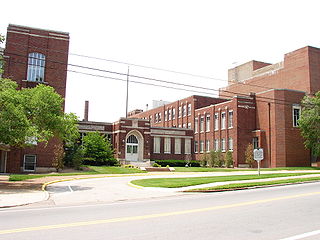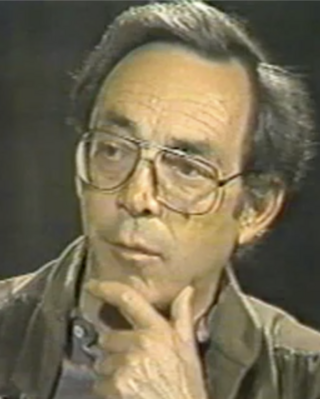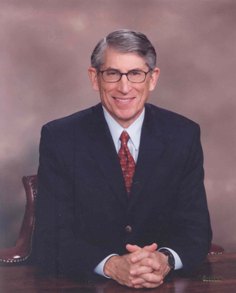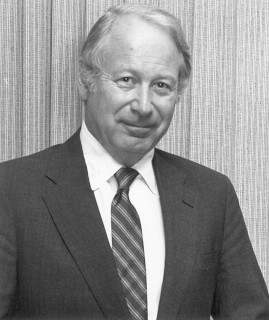Related Research Articles

Meharry Medical College is a private historically black medical school affiliated with the United Methodist Church and located in Nashville, Tennessee. Founded in 1876 as the Medical Department of Central Tennessee College, it was the first medical school for African Americans in the South. While the majority of African Americans lived in the South, they were excluded from many public and private racially segregated institutions of higher education, particularly after the end of Reconstruction.

Louis Wade Sullivan is an active health policy leader, minority health advocate, author, physician, and educator. He served as the Secretary of the United States Department of Health and Human Services during President George H. W. Bush's Administration and was Founding Dean of the Morehouse School of Medicine.

David Satcher is an American physician, and public health administrator. He was a four-star admiral in the United States Public Health Service Commissioned Corps and served as the 10th Assistant Secretary for Health, and the 16th Surgeon General of the United States.
Eugene Braunwald is an Austrian-born American cardiologist.

Bernard Lown was a Lithuanian-American cardiologist and inventor. Lown was the original developer of the direct current defibrillator for cardiac resuscitation, and the cardioverter for correcting rapid disordered heart rhythms. He introduced a new use for the drug lidocaine to control heartbeat disturbances.

Elizabeth Nabel is an American cardiologist and Executive Vice President of Strategy at ModeX Therapeutics and OPKO Health. Prior to this role, she served as President of Brigham Health and its Brigham and Women's Hospital, Professor of Medicine at Harvard Medical School, and Director of the NIH's National Heart, Lung, and Blood Institute.

Herman J. Geiger, known as H. Jack Geiger, was an American physician and civil rights activist. He was a leader in the field of social medicine, the philosophy that doctors had a responsibility to treat the social as well as medical conditions that adversely affected patients' health, famously writing prescriptions for food for impoverished patients with malnutrition. Geiger came to embody the idea of the responsibility of a physician to do something about what is now known as the social determinants of health, believing that medicine could be an instrument of social change. He served patients' medical needs as well as social and economic necessities, which he believed were in large part responsible for the health problems communities faced. He was one of the doctors to bring the community health center model to the United States, starting a network that serves 28 million low-income patients as of 2020.

Lawrence H. Cohn, was an American pioneering cardiac surgeon, researcher, and medical educator. He had been on the surgical staff at Harvard Medical School since 1971 and had been a Professor of Surgery at Harvard Medical School since 1980. In 2000, he was awarded the first endowed Chair in Cardiac Surgery at Harvard Medical School.

Yvette Roubideaux is an American doctor and public health administrator. She is a member of the Rosebud Sioux Tribe of South Dakota.

David Bates is an American physician, biomedical informatician, and professor, known for his work regarding the use of health information technology (HIT) to improve the safety and quality of healthcare, in particular by using clinical decision support. Bates has done work in the area of medication safety. He began by describing the epidemiology of harm caused by medications, first in hospitalized patients and then in other settings such as the home and nursing homes.
Howard Haym Hiatt was an American medical researcher involved with the discovery of messenger RNA. He was the onetime chair of the department of medicine at Beth Israel Hospital in Boston from 1963 to 1972. He was dean of the Harvard School of Public Health from 1972 to 1984. He was co-founder and associate chief of the Division of Social Medicine and Health Inequalities at the Brigham and Women's Hospital, and was also the Associate Chief of the hospital's Division of Global Health Equity. He was a founding head of the cancer division of Beth Israel Hospital. He was a member of the team at the Pasteur Institute, Paris, led by François Jacob and Jacques Monod, which first identified and described messenger RNA, and he was part of the team led by James Watson that was among the first to demonstrate messenger RNA in mammalian cells.
Valerie Montgomery Rice is an American obstetrician, gynecologist, and college administrator. She is the president and dean of Morehouse School of Medicine.

Richard Gorlin was an American cardiologist known for his contributions to the fields of valvular heart disease, coronary artery disease and cardiac catheterization, digitalis and vasodilators in congestive heart failure, and thrombolysis in myocardial infarctions. Along with his father, developed the Gorlin formula used to calculate valve areas in aortic valve stenosis and mitral valve stenosis.
Valerie Ellen Stone is an American physician who is a professor of medicine at the Harvard Medical School. She serves as Vice Chair for Diversity, Equity, and Inclusion, Department of Medicine, Brigham and Women's Hospital. She specializes in the management of HIV/AIDS, health disparities and improving the quality of medical education.
Jacqueline Nwando Olayiwola is an American family physician, public health professional, author, professor, and women's empowerment leader. She is the Senior Vice President and Chief Health Equity Officer of Humana and a chair and Professor in the Department of Family Medicine at Ohio State University Wexner Medical Center. Prior to her appointment at OSU, she served as the inaugural Chief Clinical Transformation Officer for RubiconMD, an eConsult platform that improves primary care access to specialty care for underserved patients. Olayiwola is dedicated to serving marginalized patient populations and addressing the social determinants through community and technology-based infrastructures of healthcare reform. She has published articles on the use of eConsults and telehealth to provide underserved patients with primary care treatments so that they have a low cost and efficient means of reaching specialized care. Olayiwola has founded numerous non-profits and healthcare start-ups such as GIRLTALK Inc, Inspire Health Solutions LLC, and the Minority Women Professionals are MVPs Program. She has been recognized at the national and international level for her work and efforts to educate, advocate and provide healthcare to those in need. She was named Woman of the Year by the American Telemedicine Association in 2019, and received the Public Health Innovator Award from Harvard School of Public Health in 2019, as well as being named one of America's Top Family Doctors from 2007 to 2008 by the Consumers Research Council of America.
The Association of Black Cardiologists (ABC) is an organization founded to bring special attention to the adverse impact of cardiovascular disease on African Americans.

Michelle Evelyn Morse is an American internist. She is an assistant professor at Harvard Medical School/Brigham and Women's Hospital and co-founded EqualHealth and Social Medicine Consortium. In 2021, Morse was named the first Chief Medical Officer of the New York City Department of Health and Mental Hygiene.
Michelle Asha Albert is an American physician who is the Walter A. Haas Lucie-Stern Endowed Chair in Cardiology and professor of medicine at the University of California, San Francisco. Albert is director of the UCSF Center for the Study of Adversity and Cardiovascular Disease. She is president of the American Heart Association. She served as the president of the Association of Black Cardiologists in 2020–2022 and as president of the Association of University Cardiologists (2021–2022). Albert is an elected member of the National Academy of Medicine, the American Society of Clinical Investigators and the Association of American Physicians.

Fatima Cody Stanford is an American obesity medicine physician, internist, and pediatrician and an associate professor of medicine and pediatrics at Harvard Medical School. She is one of the most highly cited scientists in the field of obesity. She is recognized for shifting the global perception of obesity as a chronic disease.
Bisola Ojikutu is an American physician, infectious disease specialist, public health leader and health equity researcher. In July 2021, she was appointed as the Executive Director of the Boston Public Health Commission. Ojikutu is the fifth Commissioner of Public Health for the City of Boston and the first Black woman to permanently hold this position. She currently serves on the Cabinet of Mayor Michelle Wu.
References
- 1 2 Williams, Richard Allen (March 23, 2011). Healthcare Disparities at the Crossroads with Healthcare Reform. Springer Science & Business Media. ISBN 978-1-4419-7136-4.
- ↑ "Dr. Richard Allen Williams" (PDF). CLBC. Retrieved August 21, 2020.
- ↑ "About the Founder". Minority Health Institute. May 17, 2017. Retrieved August 17, 2020.
- ↑ "Aetna: African American History Calendar: 2002: Richard Allen Williams, M.D.: Biography". www.aetna.com. Retrieved August 17, 2020.
- ↑ downstatealumni (October 7, 2016). "Richard Allen Williams, MD '62, Named 117th President of National Medical Association". SUNY Downstate Medical Alumni. Retrieved August 17, 2020.
- ↑ "Richard Allen Williams". National Medical Association. Retrieved March 27, 2021.
- 1 2 3 4 5 "Courageous Conversations | Richard Allen Williams: A Lifetime Dedicated to Diversity, Inclusion". American College of Cardiology. Retrieved August 17, 2020.
- 1 2 "Dr. Richard Allen Williams" (PDF). CLBC. Retrieved August 21, 2020.
- 1 2 Bailey, Rahn K.; Saldana, Adrienne M.; Saldana, Andrea M. (July 6, 2020). "Richard Allen Williams, M.D.: a Career Fighting Disparities and Fostering Equity". Journal of Racial and Ethnic Health Disparities. 8 (3): 566–569. doi:10.1007/s40615-020-00813-8. ISSN 2196-8837. PMC 7338106 . PMID 32632825.
- ↑ "ABC-Patient". www.abc-patient.com. Retrieved August 17, 2020.
- ↑ "Physician honored for work with minorities". EurekAlert!. June 28, 2001. Retrieved August 17, 2020.
- ↑ "Williams Gala". AMA Foundation. Retrieved August 17, 2020.
- 1 2 Staff Writer (June 22, 2019). "AMA Honors Dr. Richard Allen Wiliams[sic] » Cardiology2.0". Cardiology2.0. Archived from the original on July 2, 2020. Retrieved August 17, 2020.
- ↑ "National Medical Association Installs its 117th President - National Medical Association". www.nmanet.org. Retrieved August 17, 2020.
- ↑ "Harold on History | Black History Month and Pioneering African American Physicians". American College of Cardiology. Retrieved August 17, 2020.
- ↑ "Dr. Richard Williams To Receive Jackie Robinson Award". Minority Health Institute. December 21, 2017. Retrieved August 17, 2020.
- ↑ "Dr. Richard Allen Williams receives Compleat Award". Our Weekly. January 24, 2020. Retrieved May 1, 2021.
- ↑ "About Us". www.hcms.org. Retrieved August 17, 2020.